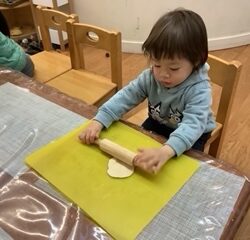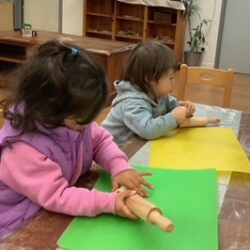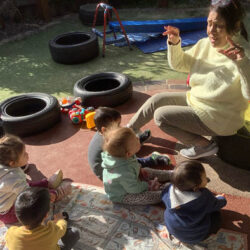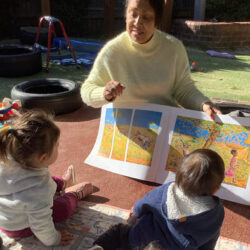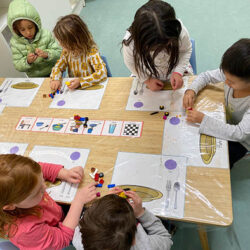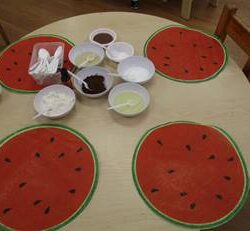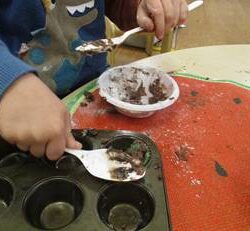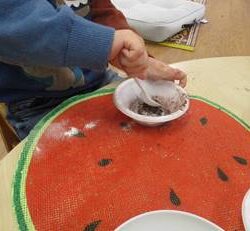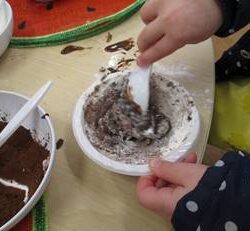Gorton House
Infants
Story by Educator Shumi
This week Gorton House babies were engaged in listening to a story book of their choice. The children participated in looking at the bright pictures and they named the different fruits and animals they could see. The children were developing their language skills and exploring the diversity of cultures and traditions of people living in different parts of the world. As I finished reading the book, I could hear the children saying “more, more” so I ended this group experience singing a song called ‘Watermelon’ which the children enjoyed clapping their hands along to.
Toddlers
Story by Educator Vasuki
In Gorton House toddlers’ room, the children have always demonstrated great interest in cooking, and they spend a lot of time in areas where we have set up play kitchens or home corners. Even in the sandpit area the children are often busy baking birthday cakes, muffins, chicken soup and many other things!
So, we have added cooking into our program to cater for and develop children’s interest in cooking, and to also support their developing language and sharing skills, and their abilities to respect each other and be collaborative in their play and learning.
We facilitated a cooking activity for the children making roti. This activity not only supported the development of the above-mentioned skills, but also helped develop their knowledge of other cultures. As we made the roti we spoke about the ingredients and cooking procedures, as well as the country where roti is mostly made and consumed.
This activity turned out to be very popular, and the children enjoyed making and tasting the roti with great pleasure!
Johnson House
Preschool
Story by Educator Sofia
Last week we started our coding journey with origami, a recurring interest at Johnson House preschool that the children have become quite skilled at. Origami is a highly step-dependant activity, which makes it a perfect ‘unplugged’ starting point to introduce coding to children. The precision and focus needed to complete an origami task are extraordinary, and its nature makes it the perfect ground to start talking about concepts like ‘Algorithms’, ‘Sequences’, and ‘Decomposition’, which are all the basis of coding.
This afternoon we continued our learning with another great unplugged experience using LEGO—building robots following a precise sequence. Before starting, we refreshed two of the concepts introduced last week, ‘algorithm’ and ‘sequence’. “Algorithm is like a manual that you use to build something,” August reminded us. “And sequence is all the steps you need to do!”, added Maddy.
Once again, the children were divided into pairs and asked to work on their task as a team. I demonstrated the sequence by building the robot first, then asked them to replicate it by working cooperatively with their partners.
While building, when one of the teams felt a bit stuck on one of the steps of the robot sequence, we had a chance to introduce a new concept: ‘debugging’. This is when we trace our sequence backwards to find a mistake in our algorithm and fix it.
Through this exercise the children practiced their problem solving, communication and listening skills, as well as their fine motor and cooperation skills. It was great to watch them work together to build LEGO robots—everyone did a great job completing this exercise and working through most of the challenges they had to face.
Family Day Care Sydney Wide
Story by Educator Support Officer Maureen
This week, we (Educator Support Officers Maureen and Alix) had the pleasure of visiting Plumtree Children’s Services in Marrickville. Plumtree provides therapies, support services and a preschool for early childhood-aged children who may have a disability or developmental delay. The visit was arranged as part of our participation in a 6-month, Commonwealth-funded Autism Spectrum Disorder project, which has helped to provide our Family Day Care Sydney Wide Educators with mentoring, knowledge and practical strategies to support children who may be neurodivergent in their family day care service. Plumtree’s preschool director Hannah gave us a guided tour of the services they provide and an opportunity for us to explore how they differentiate support for the differing needs of the children in their care. This includes strategies like setting up an ‘active room’ (for loud and busy play) and a ‘quiet room’ for times when children would like less sensory stimulation. The main intention of this visit was to gain insights into how our educators can incorporate some of these strategies within their own services, which we will now share with them in our one-on-one home visits over the coming weeks.
Community Playgroups
Story Playgroup Coordinator Rebecca
This week at Red Bug Playgroup one of our activities was a cooking experience. There were a variety of ingredients on the table and children were encouraged to choose which ingredients they wanted to put in their cupcake mixture. We had flour, vegetable oil, apple cider vinegar, dairy free chocolate milk, cocoa powder, sugar and baking powder to choose from. All of these ingredients were from a dairy, egg and gluten-free recipe we used.
The children used spoons to transfer the ingredients from the shared bowls into their own bowls, where they mixed and stirred these to create their own cupcake batter. This took a lot of concentration and also required us to use our fine motor and balancing skills. When we had finished mixing our ingredients, we baked the cupcakes. At the end of playgroup, we all got to take our cupcakes home to enjoy later.
